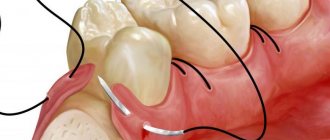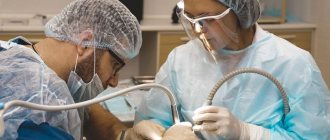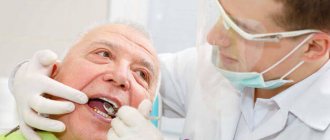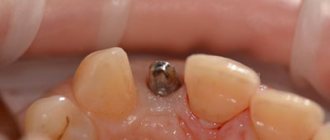Nowadays, modern dentistry is constantly evolving: new technologies are emerging and old ones are being rethought.
Thanks to this, new standards for the quality of dental treatment are being established, allowing patients to receive not only painless, but also comfortable dental treatment. However, the quality of treatment depends not only on dental materials, but also on the qualifications of the specialist who directly provides the service.
Basic medical education is not enough and dentists are constantly improving their skills. This is primarily due to the fact that each technology implies a number of strict requirements for the equipment of the dental office and has its own specific use. With the advent of new technologies in dentistry, new medical qualifications also appear, including such a type of medical activity as implantology.
Dental implantology is a branch of dentistry that deals with the restoration of lost teeth by introducing an artificial titanium rod - a dental implant - into the jaw bone. Implantation can also be performed for emergency reasons.
Emergency dental implantation can be carried out if tooth replacement is required as soon as possible, when urgent prosthetics are needed: for example, tomorrow you have a business meeting or a significant event.
For emergency implantation, implants are used that have a special structure that promotes reliable primary stabilization in the jaw bone, due to which the dental implant is able to withstand the chewing load after its installation and the crown is fixed to the implant immediately. The dental implantation process lasts no more than two hours.
Thus, you have a real opportunity to instantly replace a problematic tooth with a new one, and you do not have to worry about having to go without a tooth for a long time. Make an appointment Today there are many myths around implantology, some of them are true, others are not. Let's look at the main ones.
Myth No. 1: After extraction, any tooth can be replaced with an implant.
In the photo: installed implants immediately after careful tooth extraction
The success of implantation begins with gentle tooth extraction, allowing maximum preservation of the jaw bone without damaging it. It is very important to preserve the walls of the socket, since they are a natural framework for filling the socket with artificial bone granules, which promotes better regeneration of the jaw bone tissue in the socket area or around the implant, if the implantation was carried out in the socket of an extracted tooth.
Therefore, the main condition for simultaneous tooth implantation immediately after extraction is careful preparation and advance planning.
It is worth recalling that under the condition of one-stage implantation, in the case when it is necessary to remove a tooth and replace it with an implant, it is very important to understand: tooth extraction and implant installation occurs in one step, after CAREFUL tooth removal, a dental implant is inserted, after which the crown is already fixed on the tooth .
If time passes after tooth extraction, even 1 day, then installation of the implant is postponed for 2 months until the tooth socket heals and the tissue is restored.
Myth No. 2: You have to wait a long time after dental implantation
It is not at all necessary to wait for the implant to heal in order to place a crown. There are two methods of dental implantation:
1. Classic or two-stage dental implantation , which is carried out as follows: first, the implant is installed, after which the gum is sutured, and after 2-4 months a permanent crown made of metal ceramics or zirconium dioxide is installed on the implant.
2. Dental implantation with immediate load or one-stage dental implantation : immediately after the implantation operation, a temporary crown is made on the tooth, and the implant heals under load for several months, after which the temporary crown is replaced with a permanent one.
Myth No. 3: Any implant is suitable for emergency implantation
This statement is completely false. The fact is that there are no universal tools. It's the same with implantation.
In the photo: a special implant for emergency dental implantation
For different dental implantation methods, implants of different structures are used, and what is good for classical implantation is not suitable for one-stage implantation.
For one-stage implantation, dental implants of a special structure are used, which allows them to withstand the chewing load immediately after implantation.
Therefore, if you are planning implantation, ask how many implantation systems the dental clinic has. A self-respecting dental clinic that deals with implantation professionally, and not from time to time, has several implantation systems in its arsenal. Sign up for a consultation
Rehabilitation period
In addition to avoiding strong and low-alcohol drinks, patients after sinus lift and bone grafting should adhere to the following recommendations:
- avoid heavy physical activity and active sports;
- postpone air travel for a month;
- try to climb to high floors by elevator, rather than on foot;
- carry out the prevention of colds, since due to severe sneezing, runny nose and cough, implants may fall out;
- Avoid foods that are too hard, hot or cold;
- Try not to drink drinks through a straw.
Such recommendations are universal and suitable for every patient, regardless of the type of surgery performed. But, in some cases, the dentist may prescribe a special diet, mouth rinse and healing medications to speed up the recovery process.
Myth No. 4: Dental implantation is a traumatic process
Modern dentistry is constantly evolving, and if previously dental implants were literally hammered into the patient’s jaw with a hammer, in a modern dental clinic everything is aimed at minimizing bone trauma and maximizing patient comfort.
During the implantation process, our clinic uses special equipment, and the installation of dental implants is carried out according to modern surgical protocols, which allows us to reduce tooth trauma to zero.
As mentioned above, tooth extraction before implantation is carried out as carefully as possible. To do this, in our clinic we use special tools:
German forceps for tooth extraction with a special structure, allowing you to control each stage of tooth or root removal.
Periotomes are an American set of tools that allow you to maximally weaken the ligamentous apparatus of the tooth, which makes it possible to remove the tooth more easily, with virtually no “swinging,” which ensures the safety of the walls of the tooth socket.
Piezotome is an ultrasonic device that allows you to carefully work with bone tissue during its removal. The piezotome allows the surgeon to create a thin cut and separate the roots of the tooth, after which he carefully extracts the roots one at a time, preserving the bone septum.
Luxators are special tools that make tooth extraction easier.
All this allows you to preserve the jaw bone and perform dental implant surgery with minimal trauma. In some cases, it is possible to carry out implantation through the gum or into the socket without bloodshed.
Myth #4: Implant rejection
Most often, when hearing the word “implantation,” patients have a direct association with organ transplantation, and they naturally project this onto dental implantation. In fact, there is a huge difference between the engraftment of a donor organ and a dental organ.
A dental implant, unlike a transplanted organ, is integrated into the bone tissue (osseointegration) rather than engrafted.
Osseointegration is the process of ingrowth of bone cells into the complex surface of a dental implant.
Thus, the implant is securely held in the jaw bone. The healing process can be affected by infection of the tissues surrounding the dental implant, excessive stress on the implant, failure of the surgeon to follow the implant installation protocol, and the use of inappropriate equipment and instruments.
Myth #5: Age restrictions
Sometimes patients do not consider the option of restoring teeth with implants and choose less comfortable removable dentures, thinking that due to the patient’s age, the installed implants may be rejected.
In fact, age is not an absolute contraindication for dental implantation. Agree, age and tooth loss are interconnected things.
In fact, age may be a contraindication if the patient cannot fully brush his teeth on his own and has serious diseases that prevent implantation. To get a consultation
Myth No. 6: Implantation is impossible if the jaw bone is atrophied
Indeed, if the jaw bone tissue is too “thin” or “loose”, then there is simply no place to place a dental implant. For this reason, some dentists even refuse implantation to the patient.
If you were denied implantation, then most likely your dentist does not know the technique of jaw bone augmentation. Jaw bone augmentation is a technique that allows you to fill the missing volume of bone tissue for implantation. The most common osteoplastic surgeries are:
Sinus lifting is a surgical change in the relief of the bottom of the Maxillary sinus. It involves lifting the membrane lining the bottom of the sinus and filling the resulting space with artificial bone granules.
Guided bone regeneration surgery or GBR. The essence of this operation is to graft bone into the atrophied area and fix it with a barrier membrane.
Splitting of the narrow alveolar ridge. The operation involves thin cutting of the alveolar process of the jaw bone, spreading its edges and filling the resulting space with bone granules.
Augmentation with bone blocks - the surgical technique consists of taking from one area (most often the mental or retromolar) and transplanting a piece of bone into the atrophied area of the bone.
Operation concept
Sinus lifting is a specific operation that is prescribed to patients in case of insufficient thickness of their own bone tissue. It is carried out in the upper jaw area, thickening the bone, which has atrophied. This is a real surgical procedure that is performed by experienced and well-trained dentists. The essence of the action:
- The doctor uses osteotomes to push back the bottoms of the sinuses through a narrow gap in the gum.
- The empty space is filled with artificial bone.
- The procedure is completed, and the material takes root over time.
Bone wasting can be caused by the following factors:
- characteristic features of the jaw structure;
- age-related changes;
- long-term lack of pressure on a specific area due to tooth loss in the past.
Quite often, a sinus lift is needed if the patient has lost a tooth a long time ago. It does not matter whether it was an injury or a forced removal, the result is always the same - there was no load on the gums, and, consequently, bone tissue atrophy occurred. Another common case is the low location of the maxillary sinus, resulting in a lack of space for implant installation.
The sinus lift procedure has been in great demand among dentists for 30 years, since with its help any patient has the opportunity to appreciate all the advantages of dental implantation, regardless of existing dental diseases.
Myth No. 7: Implantation and pregnancy
The information that implantation is impossible during pregnancy is absolutely true.
The fact is that the dental implant itself is not harmful and does not affect the body in any way, however, when installing dental implants, very strong anesthetics are used, which contain prolongators (most often adrenaline), the use of which is undesirable during pregnancy, and in some cases it is contraindicated.
Moreover, when implanting teeth, there is a need for x-rays, which is also undesirable.
Pregnancy for dental implantation is a temporary contraindication. So, implantation is possible after breastfeeding is completed.
Why are alcoholic drinks contraindicated before implantation?
Alcoholic drinks should be avoided at least 24 hours before the date for which the operation is scheduled. This is primarily due to the need to administer anesthetics. If alcohol enters the bloodstream, it can reduce the effectiveness of the pain reliever or provoke an allergic reaction. In addition, alcohol dilates blood vessels and affects blood clotting. This creates a risk of bleeding and other complications during surgery.
The period of abstaining from alcohol after surgery is much longer. There are also serious reasons for such a restriction, since alcohol in this case can also cause a number of negative consequences.
Myth No. 8: After implantation, you should not drink alcohol or smoke.
Absolutely right. For several days after implantation, patients are strictly advised not to drink alcohol and also refrain from smoking.
Believe me, this is not because implantologists are so evil and forbid you to enjoy life, but because alcohol has an irritating effect on unhealed gums and makes healing difficult, and can also cause inflammation and implant rejection.
So, if you want to “disinfect” your wound after implantation, then think about the consequences and material cost of such an act.
Consequences before implantation
It is necessary to dwell in more detail on what consequences may occur due to alcohol consumption before implantation. The effect of the anesthetic may not be sufficient to completely eliminate discomfort. The patient may also experience low blood pressure, become dizzy, or faint, which will make the operation impossible until his condition is completely normalized.
Sometimes alcohol leads to disturbances in heart rhythms, difficulty breathing, swelling of the larynx, allergies, which is extremely rare, but can also lead to death in dental practice. If you take alcohol after the intervention, the effect of anesthesia will increase several times, that is, the toxic effect on the body will be twice as strong. This is very dangerous, as it can lead to the development of complications, for example, toxic hepatitis.
But not only alcohol should be avoided in the first few days after the pin is implanted. These restrictions also apply to strong black and green tea, instant and regular coffee, sugary drinks such as soda, and fresh and store-bought juices. Following the recommendations of doctors will allow you to recover faster without endangering your health.
Myth #9: Swelling after implantation
Our patients often ask the question: do they need to take time off from work or take sick leave after dental implantation and whether the proposed implantation will affect the patient’s appearance.
Dental implantation is a low-traumatic process, naturally provided that the indications and implant installation protocols are followed. After surgery, patients often experience a slight feeling of heaviness in the implanted area for several days after surgery.
Most often, swelling is possible during more complex and extensive surgical interventions, such as bone grafting.
To drink or not to drink: that is the question
We understand that sometimes a little sip is necessary. For example, so as not to offend the owners of the house or the organizers of the event. But here it is important to know when to stop and remember that new teeth are not only useful, but also quite expensive.
You personally need to weigh the pros and cons. Either get momentary pleasure, questioning the survival of the implants and risk losing the guarantee from the clinic, or still give up alcohol and enjoy your new teeth for a very, very long time.
To the question “can you drink after implantation,” our answer is categorical. NO. Check out our ARGUMENTS why we strongly DO NOT recommend drinking alcohol after having implants installed.









